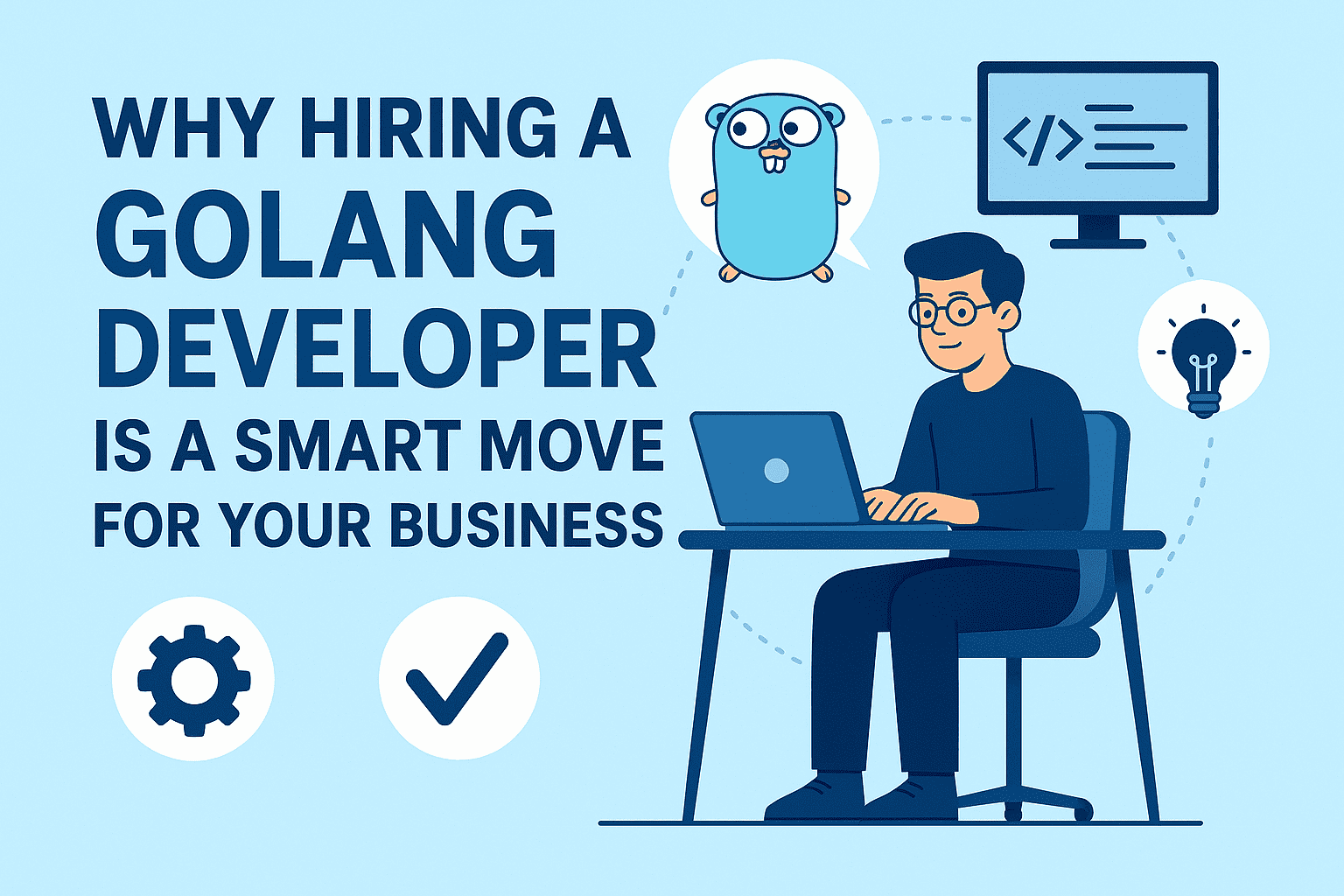Why Hiring a Golang Developer Is a Smart Move for Your Business?

As the digital world demands more scalable, efficient, and reliable software, Golang (Go) has emerged as a top choice for modern backend and cloud-native development. Whether you’re building high-performance APIs, microservices, or distributed systems, a skilled Golang developer can be the catalyst that propels your business forward. Here’s a comprehensive, in-depth guide to hiring a Golang developer—what makes them unique, the benefits they bring, and the key skills to look for.
1. What Is Golang and Why Is It in Demand?
Golang, also known as Go, is an open-source programming language developed by Google. It’s designed for simplicity, speed, and scalability—making it ideal for building cloud applications, microservices, APIs, and large-scale distributed systems. Its unique concurrency model, efficient memory management, and robust standard library make it a favorite for businesses aiming for high performance and reliability.
2. Unique Benefits of Hiring a Golang Developer
A. High Performance and Scalability
- Golang is compiled, delivering fast execution and low latency—essential for real-time applications and high-traffic platforms.
- Its built-in concurrency (goroutines and channels) allows developers to handle thousands of tasks simultaneously, making your systems highly scalable.
B. Cloud-Native and Microservices Ready
- Go is the backbone of many cloud-native projects, including Kubernetes and Docker.
- Golang developers are adept at building microservices architectures, enabling your business to deploy, scale, and update services independently for greater agility.
C. Efficient Development and Deployment
- Go’s simplicity and concise syntax mean faster development cycles and easier code maintenance.
- Developers can quickly build, test, and deploy robust applications, reducing your time-to-market and operational costs.
D. Cross-Platform Compatibility
- Golang supports multiple operating systems (Windows, Linux, macOS), letting you target diverse user bases with a single codebase.
E. Strong Community and Ecosystem
- Go has a vibrant, fast-growing developer community, ensuring access to best practices, open-source libraries, and continuous innovation.
3. Essential Skills to Look for in a Golang Developer
When hiring a Golang developer, prioritize candidates with the following core competencies:
- Proficiency in Go Programming: Deep understanding of Go’s syntax, data structures, and idioms.
- Concurrency and Parallelism: Experience with goroutines and channels to build efficient, concurrent applications.
- Web Frameworks and RESTful APIs: Ability to use frameworks like Gin, Echo, or Beego and build secure, scalable APIs.
- Database Integration: Skilled in SQL (PostgreSQL, MySQL) and NoSQL (MongoDB) databases, including ORM libraries and query optimization.
- DevOps and Cloud: Familiarity with Docker, Kubernetes, CI/CD pipelines, and cloud platforms (AWS, GCP, Azure) for modern deployment.
- Testing and Debugging: Proficiency with Go’s testing tools for unit, integration, and end-to-end tests, ensuring reliable, bug-free software.
- Security Best Practices: Knowledge of secure coding, data protection, and vulnerability mitigation.
- Version Control: Experience with Git and collaborative workflows for efficient team development.
- Soft Skills: Strong communication, problem-solving abilities, and time management—crucial for remote and collaborative work environments.
4. What Can a Golang Developer Build for Your Business?
- Microservices and APIs: Power your SaaS, mobile apps, or web platforms with scalable, high-performance backend services.
- Cloud-Native Applications: Leverage Go’s strengths to build resilient, containerized apps ready for Kubernetes and cloud deployment.
- Real-Time Systems: From messaging platforms to IoT, Go’s concurrency makes it perfect for real-time data processing and event-driven architectures.
- Automation Tools: Streamline your DevOps, data processing, and infrastructure management with custom automation solutions.
- Distributed Systems: Build robust, fault-tolerant distributed applications that scale effortlessly as your business grows.
5. The Business Impact: Why Go Developers Are a Competitive Advantage
- Faster Time-to-Market: Rapid development and deployment cycles keep you ahead of the competition.
- Reduced Costs: Efficient code, fewer bugs, and easier maintenance mean lower long-term operational expenses.
- Future-Proof Solutions: Go’s popularity is rising, backed by a strong community and major tech companies, ensuring your investment remains relevant and supported.
- Reliability and Uptime: Go’s performance and concurrency features help deliver applications that are stable, responsive, and always available.
6. How to Find and Hire the Right Golang Developer
- Look for Proven Experience: Check for a solid portfolio, open-source contributions, or experience with projects similar to yours.
- Test Technical and Soft Skills: Use coding assessments, technical interviews, and scenario-based questions to gauge both expertise and communication.
- Prioritize Problem-Solving: The best Go developers are creative thinkers who can architect solutions for complex business challenges.
- Consider Remote and Global Talent: The Go community is global—don’t limit your search to one location.


